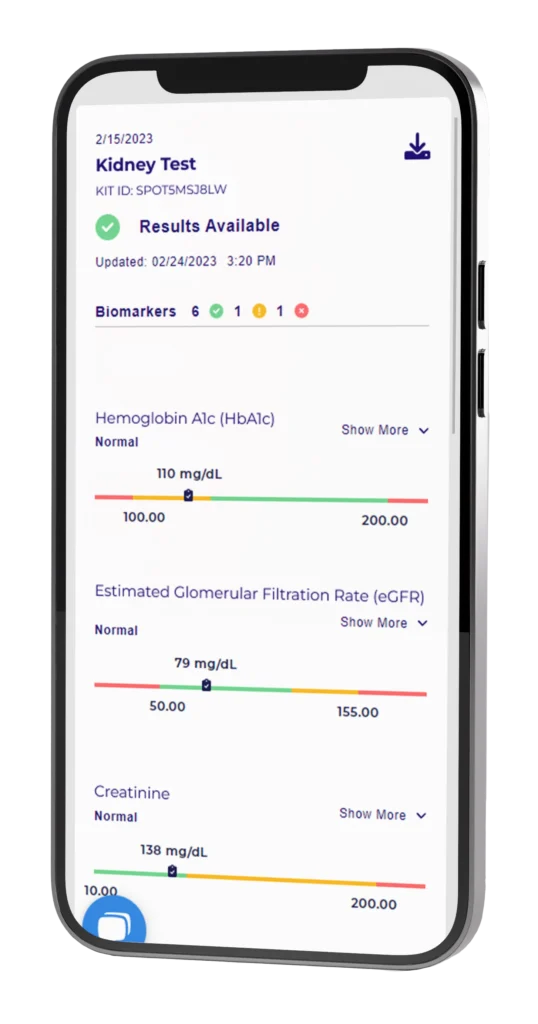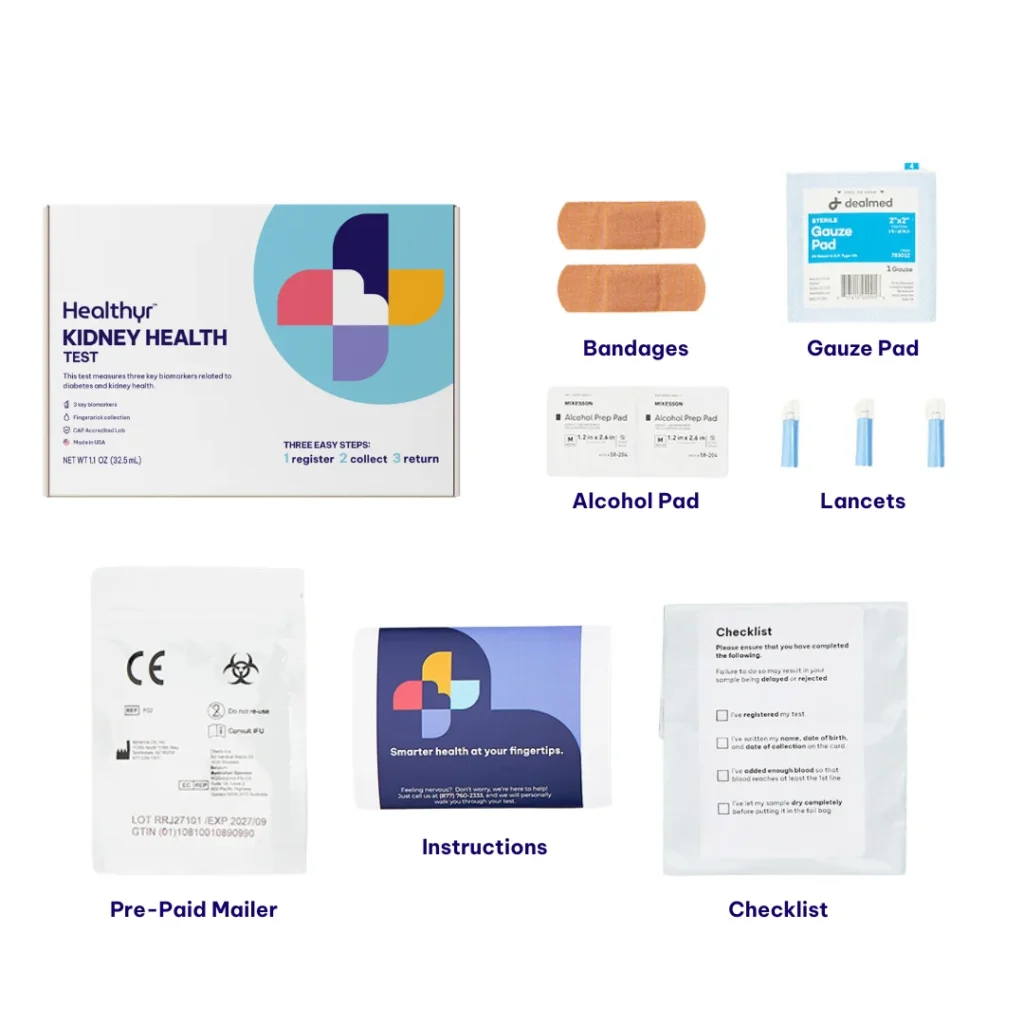Kidney Health Test
$59.99
Free Shipping
Check your kidney health and indicators of kidney disease in this easy at-home health test.
Not available in NY State.
Tests For:
HbA1c, Creatinine, and Estimated-Glomerular Filtration Rate (eGFR)

Pay in 4 easy payments with PayPal Pay Later or Afterpay
- FSA/HSA Eligible
- For adults 18+
- Results in 7 days
- FSA/HSA Eligible
- For adults 18+
- Results in 7 days
Biomarkers tested
Creatinine
Creatinine is a byproduct of normal muscle function that is filtered out of your blood by your kidneys and exits your body in urine. Diabetes can impair the kidneys’ ability to remove creatinine from blood. Measuring creatinine can help understand whether your kidneys are functioning properly.
eGFR
Estimated Glomerular Filtration Rate (eGFR) is the estimated rate at which your kidneys are able to produce “cleansed blood” by filtering out waste products, like creatinine. This number is calculated using your serum creatinine result along with your age, weight, and biological sex. A care provider can use this number to understand how well your kidneys are functioning and if you may benefit from medical or lifestyle interventions to improve kidney function. If you have diabetes, it is especially important to understand how your condition is affecting your kidneys.
Hemoglobin A1C (Hba1c)
A hemoglobin A1c (HbA1c) test measures the amount of sugar (glucose) attached to hemoglobin. This biomarker indicates your average blood sugar level over the past three months, which may be useful in identifying people suffering from diabetes or prediabetes. In people with known diabetes or prediabetes, HbA1c levels help indicate how well these conditions are being managed.
Biomarkers tested
HbA1c
Creatinine
Estimated-Glomerular Filtration Rate (eGFR)
What is it and how does it affect me?
Creatinine is a byproduct of normal muscle function that is filtered out of your blood by your kidneys and exits your body in urine. Diabetes can impair the kidneys’ ability to remove creatinine from blood. Measuring creatinine can help understand whether your kidneys are functioning properly.
What is it and how does it affect me?
Estimated Glomerular Filtration Rate (eGFR) is the estimated rate at which your kidneys are able to produce “cleansed blood” by filtering out waste products, like creatinine. This number is calculated using your serum creatinine result along with your age, weight, and biological sex. A care provider can use this number to understand how well your kidneys are functioning and if you may benefit from medical or lifestyle interventions to improve kidney function. If you have diabetes, it is especially important to understand how your condition is affecting your kidneys.
What is it and how does it affect me?
A hemoglobin A1c (HbA1c) test measures the amount of sugar (glucose) attached to hemoglobin. This biomarker indicates your average blood sugar level over the past three months, which may be useful in identifying people suffering from diabetes or prediabetes. In people with known diabetes or prediabetes, HbA1c levels help indicate how well these conditions are being managed.
Results you can trust + understand
- At-home diagnostic test
- Easy finger prick collection
- Lab results within days
- Track your lab information all in one place
- Secure portal with personalized next steps




Your kit comes with everything you need to collect your sample
- Lancets
- Pre-paid Mailer
- Bandages
- Alcohol Pad
- Checklist
- Gauze Pad
- Instructions
- Takes just 15-20 minutes
- Discreet packaging
- CLIA Lab Certified
- Takes just 15-20 minutes
- Discreet packaging
- CLIA Lab Certified
How it works
Register
Register your test online using the unique ID number that comes with the kit.
Collect
Following the instructions provided, collect your sample – it’s fast and easy!
Return
Mail your sample to our lab using the prepaid envelope included in your test kit.
Results
Receive your private HIPAA compliant results to your Healthyr portal in 3 days!


Test Smarter, Not Harder
Healthyr uses microsampling technology to offer health tests that can be done in the comfort of your home. There is no need to visit a medical professional or lab– you collect your sample yourself using a simple finger prick.
This test is for you


If you have Type 1 or Type 2 Diabetes.
Diabetes is the leading cause of kidney disease in the United States. Kidney disease typically doesn’t show symptoms until the kidneys are badly damaged. If you’re diabetic, it is important to monitor your kidney function more closely so that you can catch warning signs early and take action.


If you have high blood pressure.
High blood pressure is the second leading cause of kidney disease in the United States. If you have high blood pressure, it is important to check your kidney function regularly so that you can catch early warning signs and take action.


If you have a family history of kidney disease or kidney failure.
If you have a close relative such as a parent, sibling, or grandparent who has been diagnosed with kidney disease, you may be at greater risk of developing kidney disease yourself. Checking your kidney health more often can help you catch warning signs early.


If your HbA1c or Creatinine results were elevated in another Healthyr test.
Both elevated HbA1c and Creatinine can indicate an increased risk of kidney damage. If either of these were elevated in another Healthyr test, you may want to use this test to retest these indicators of Kidney health.


If you take medication that can affect kidney function.
Certain medications such as Proton Pump Inhibitors (PPIs), Diuretics, Beta Blockers, Vasodilators, lithium, NSAIDs (e.g. aspirin, acetaminophen, and ibuprofen), and certain antibiotic and antiviral medications can affect kidney function over time.
About our labs and science
Accuracy
+
Reliability
Lab Safety
+
Sterility
Privacy
+
Security
Our tests use an accurate and reliable form of microsampling called Dried Blood Spot Testing. This form of testing has been used since the 1960s in Neonatal care and for testing in remote locations. You may be familiar with the heel prick performed on newborns during their initial health assessment– this is Dried Blood Spot Testing.
Our state-of-the-art lab is CLIA-certified and CAP-accredited. We pride ourselves on our use of validated and reliable testing methods as well as our stringent quality control measures.
If you would like to learn more about our lab processes and accreditations, check out our labs & science page.
Healthyr adheres to strict privacy and security measures to protect your personal health information. Our technology has encryption and safety protocols in place and every employee, from customer service to CEO, is trained in HIPAA compliance.
Frequently Asked Questions
Your blood test is most accurate if you take it fasted, meaning before you have anything to eat or drink (other than water). We recommend taking it first thing in the morning.
Using the Kit ID number, register your test on behealthyr.com. This number is anonymous in our system but allows us to notify you when your test arrives at the lab and your results are ready. It also ensures the lab is able to connect your results to you.
Next, take a moment to get your blood flowing. This will help make your sample collection easier. Drink a tall glass of water for hydration, then wash your hands for a least one minute in warm water to improve circulation and blood flow.
Clean the finger you want to prick with the alcohol wipe. Remove the lancet cap then hold the lancet against the tip of your finger. Press the lancet button to perform the finger prick. Next, hold your pricked finger over the ADX card’s sample collection window. You can gently squeeze your finger to get more droplets (you’ll need about 8 in total to fill the card). You may also perform a “milking” motion, applying gentle pressure on either side of the base of your finger and slowly moving toward the fingertip.
Once filled, leave your ADX card to dry for at least one hour. Meanwhile, clean up and dispose of the used collection tools by sealing them into a bag and placing them in the garbage. As soon as your sample is dry, place it into the sample bag and then slide it into the prepaid envelope. You’ll want to mail your test the same day, so head to your nearest mailbox and drop it inside.
You will be notified when your sample arrives at the lab and then again when your results are ready to view.
Yes. We recommend taking your Kidney Health Test first thing in the morning before you eat or drink anything (other than water, of course!) to ensure accurate results. This includes supplements, so please wait until after your test to take your morning multivitamin or similar.
While no guidelines from primary care organizations recommend screening asymptomatic adults for chronic kidney disease, the National Kidney Foundation recommends testing at-risk adults (such as people with high blood pressure or diabetes) at least once every year. If you’ve been diagnosed with chronic kidney disease, you should test for kidney function more frequently under the guidance of your care provider.
There are a number of options available if you receive an abnormal result. Depending on the biomarker out of range, you may choose to speak with your PCP or book a low-cost, same-day telehealth appointment here. In some cases, your physician may recommend medication or a prescription-strength supplement to help improve your levels. Our pharmacy service can help with that. Alternatively, if you are experiencing a nutrient deficiency such as low Vitamin B12, you may opt to start taking a multivitamin or targeted supplement to improve it.
Yes, healthy kidney function is critical to having a healthy pregnancy and kidney dysfunction is a common and serious pregnancy complication.
Yes, there is no reason you cannot take the Kidney Health Test while on your period.
No, medications will not interfere with the accuracy of the test. However, your results may reflect the impacts that medication or vitamin supplementation may have on your blood biomarkers.
No, supplementation will not interfere with the accuracy of the test. However, your results may reflect the impacts that medication or vitamin supplementation may have on your blood biomarkers.
No, insurance is not required for any of Healthyr’s at-home health tests.
Nope! Everything, from lab fees to the envelope you mail your sample in, is included in the price of your test.
Have more questions? Contact us!
Our team of experts is available Monday-Friday 9 AM – 9 PM EST to answer your questions, troubleshoot issues, and provide guidance on best practices.

